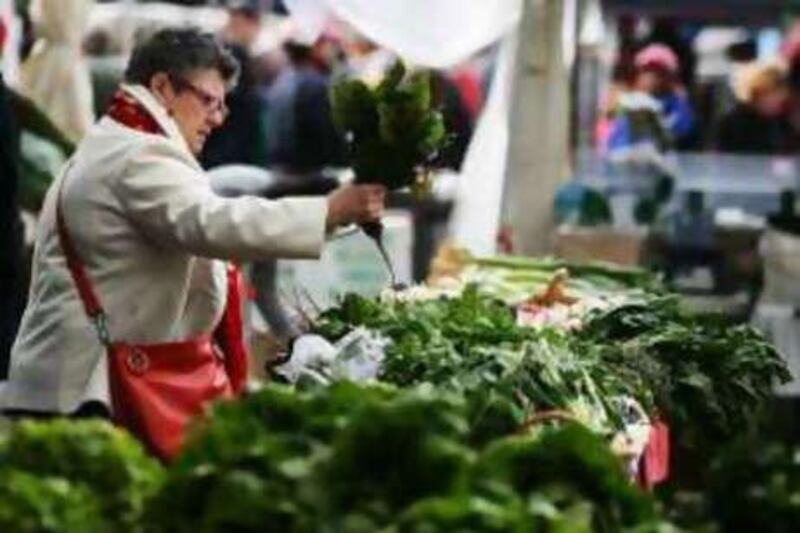SYDNEY // Australians are turning in ever increasing numbers to organic food as worried consumers become more aware of the health and environmental benefits of chemical-free fruit and vegetables. Australia has the biggest area of land devoted to organic farming in the world, about 12 million hectares. A study by the Biological Farmers of Australia, a non-profit industry group, shows that sales of organic produce have increased by 80 per cent since 2004 and are worth about US$220 million (Dh810m) a year. "It was quite a pleasant surprise for us," said Andrew Monk from the Biological Farmers of Australia. "We were expecting the figures for domestic growth to be quite suppressed. What we found was an 80 per cent increase since the last report, which was done four years ago." But Mr Monk said about two per cent of Australia's farmers are organic, and the industry is a decade behind that of many European countries. "We haven't had the sort of food scares that Europe has had, such as mad cow, and because of that, we think that's one of a number of reasons why there's been a slower growth in awareness by Australian consumers of the value and benefit of organic produce," he said. Australia's taste for naturally produced food is driven in large part by demand from supermarket chains along with the popularity of farmers' markets. On a blustery weekend in Sydney, hundreds of shoppers, many laden with bags sprouting an array of green leaves and celery sticks, brace the late winter chill at the Orange Grove market in the suburb of Leichhardt. Bacon sizzles on a barbecue and its salty aroma fills the air amid stalls selling cheese, vegetables and clothes made from bamboo. Di Eva is a regular, and munches on an organic apple as she explains why she is an enthusiastic disciple of food that has been produced without the use of fertilisers and pesticides. "The chemicals that we're ingesting worry me," she said. "Cancers don't arise from nothing. I think one of the things contributing to people getting cancers is all the chemicals." Health concerns are a common theme among many Orange Grove customers. "I really worry about pesticides," said Harriet, 45. "I have read reports that there's potential for Parkinson's disease from pesticides." There is, however, another major factor that preoccupies the minds of shoppers - price. Organic food invariably costs more than its conventional cousin in the supermarkets, and such consumers as Jo Andrews, 35, are frustrated that quality does come at a price. "I'd love to buy it [organic food] all the time, but I can't afford it. It's far too expensive," she said. Her friend Simon, 36, agreed. "I think prices are a bit too high," he said. "Especially for families with little kids." Naturally grown food can cost significantly more than non-organic provisions - up to 70 per cent in some instances - but Stephen Choularton, who runs the Orange Grove market, says the gap is shrinking. "We reckon that our prices for organic food on the market are not dissimilar to the prices for conventional food in the supermarkets," said Mr Choularton, who explained that the organic industry in Australia has enjoyed almost a decade of strong growth. "There have been some food scares here, and people have become more aware of the effects of modern farming, and the whole thing has grown enormously over the last seven years." Strong demand has brought more growers into a strictly controlled business. To be certified organic, farmers must conform to stringent regulations that cover every step of the production process. It is usually more labour intensive and on a smaller scale than conventional agricultural methods, which explains the higher prices paid by consumers. "Organic standards for food and agriculture here are arguably the toughest in the world, and one could argue higher than the European standard," said Mr Monk. It is demanding work too for those feeding Australia's appetite for organic food. "It is a good occupation, but it is very hard work," said Mary Bucknall, a farmer who grows rhubarb and herbs at Mangrove Mountain north of Sydney. Along with her husband, Mrs Bucknall works 80 hours a week and also keeps a wary eye on Mother Nature. "The weather plays a big part. If you've got a bad lot of rain, you can lose all your crops, and you've got the other extreme of too much dry and you lose your crops too. There's no happy medium," she said. At another market stall Graham Sanders, a farmer from the New South Wales town of Bathurst, is busy selling his organic garlic - "the best in Australia", he says - to eager customers. He said prices do need to fall before Australia's organic revolution gathers more momentum. "Until the price comes down a little bit, I think organic produce will be beyond the means of people on an average or below average income. Generally in Australia people tend to be motivated more by price than quality, but organic food does taste better, and it's better for you." @email:pmercer@thenational.ae
Australians reach for organic alternatives
With the continent boasting the biggest area of land devoted to pesticide-free farming, the industry is booming despite high prices.

More from the national




